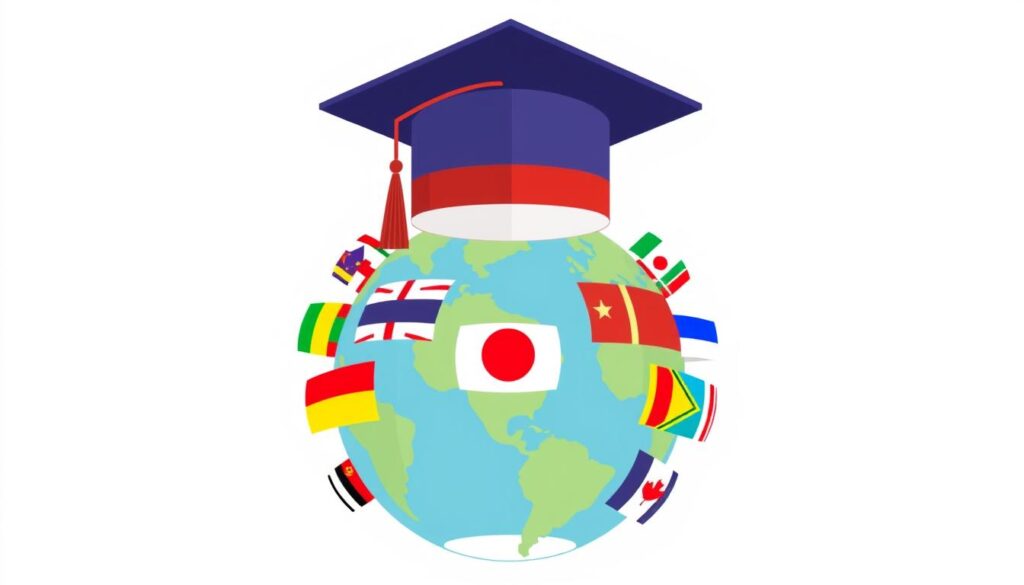Pursuing a Master Degree Abroad can be a transformative experience that opens up new opportunities for personal and professional growth.
Students who study abroad gain exposure to diverse teaching methodologies, research approaches, and professional networks, enhancing their career prospects in a globalized job market.
The experience of living and studying in another country fosters valuable soft skills, including adaptability, cross-cultural communication, and problem-solving, making graduates more attractive to employers.
Key Takeaways
- Pursuing a graduate degree in another country can significantly enhance career prospects.
- International graduate education exposes students to diverse teaching methodologies and research approaches.
- Gaining a global perspective through studying abroad is highly valued by employers.
- Students develop valuable soft skills, including adaptability and cross-cultural communication.
- The experience demonstrates independence, resilience, and a willingness to step outside comfort zones.
The Global Advantage of International Graduate Education
The global advantage of international graduate education is a key factor in shaping the careers of ambitious students. Studying for a master’s degree in another country can open up new opportunities, allowing students to gain global connections and learn about different cultures.

Students who pursue graduate programs abroad can improve their language skills and boost their resumes. A degree from abroad can stand out to employers, showing adaptability and a global mindset, which can be great for international careers.
Career Benefits Beyond the Classroom
International graduate education provides students with unique networking opportunities across multiple countries, creating connections that can lead to global career opportunities. Employers value candidates with international experience as it demonstrates adaptability, cultural sensitivity, and the ability to work in diverse environments.
Graduate programs abroad often include practical components like internships with international organizations, giving students real-world experience that directly translates to career advancement.
Standing Out in a Competitive Job Market
The perspective gained from studying within different educational systems helps students develop critical thinking skills and innovative approaches to problem-solving, making them stand out to potential employers. Language acquisition and cross-cultural communication skills developed during international study are valuable assets in multinational companies and organizations.
International graduate degrees often expose students to cutting-edge research and methodologies in their field, providing a competitive advantage in specialized industries. The experience of navigating different academic and professional environments helps students develop resilience and adaptability that translates directly to workplace success.
Top Destinations for Your Master Degree Abroad

As the demand for international education continues to grow, several countries have emerged as top destinations for master’s degree seekers. These countries offer a unique blend of academic excellence, cultural diversity, and career opportunities that attract students from around the world.
European Powerhouses: UK, Germany, and Ireland
European countries like the UK, Germany, and Ireland remain top choices for international graduate students. The UK is home to world-renowned institutions like Oxford, Cambridge, and LSE, offering a wide range of master’s programs. Germany attracts students with its tuition-free public universities and strong focus on research and engineering programs. Ireland has emerged as an excellent option for English-speaking students, with universities located in cities and towns perfectly catered to student life.
Beyond Europe: Australia, Canada, and Asia
Beyond Europe, Australia and Canada have become increasingly popular destinations, offering high-quality education, post-graduation work opportunities, and pathways to immigration for international students. Australia is especially welcome to international students with well-respected universities. Asian countries like Singapore, Japan, and China are also developing as educational hubs, with competitive programs in business, technology, and engineering that often feature strong industry connections.
Choosing the Right Country for Your Field
When selecting a destination country, students should consider factors beyond university rankings, including program specializations, research opportunities in their field, language requirements, and career prospects after graduation. Different countries excel in different academic disciplines – Germany for engineering and applied sciences, the UK for humanities and business, Australia for environmental sciences – making the choice of country strategic for career development.
Financial Considerations: Is a Master’s Degree Abroad More Affordable?
Many prospective graduate students wonder if obtaining a master’s degree abroad is more affordable than staying in the US. The answer lies in a detailed examination of various factors including tuition fees, living expenses, and potential earnings while studying.
Tuition Comparison: US vs. International Programs
One of the primary considerations for students is the cost of tuition. Many countries offer high-quality graduate programs at significantly lower tuition rates than those found in the US. For instance, countries like Germany, France, and Norway have public universities that charge minimal or no tuition fees even for international students. In contrast, the UK, Australia, and Ireland have tuition fees that range between $15,000-$30,000 USD on average for international students. As Dr. Maria Rodriguez, an education consultant, notes, “The financial equation of pursuing a master’s degree abroad often works in students’ favor, with many international programs offering significantly lower tuition rates than comparable US institutions.”
When comparing costs, it’s essential to look beyond the headline tuition figures. Additional expenses such as application fees, student services fees, and program-specific charges can add up. As highlighted in a recent study, “students should understand the total financial commitment involved in pursuing a graduate degree abroad.”

Living Expenses and Hidden Costs
Living expenses can vary dramatically between destinations. While Nordic countries and major cities like London have high costs of living, other European and Asian locations may offer more affordable housing and daily expenses. It’s crucial for students to research and factor in these costs to get a realistic picture of their expenses. As emphasized by financial experts, “living costs can be steep in many places overseas, with cities around the world seeing price hikes for basic needs like housing and food.”
Working While Studying: Possibilities and Limitations
International students should also research visa regulations regarding work permissions. Many countries allow part-time employment during studies, but there are specific limitations on hours and types of work. Understanding these regulations can help students plan their finances better. According to
“International students can work part-time during their studies in countries like Australia and the UK, but they need to be aware of the restrictions on working hours.”
This can be a significant factor in offsetting living expenses.
In conclusion, while there are various costs associated with pursuing a master’s degree abroad, many students find that the overall expense is comparable to, if not less than, studying in the US. By carefully considering tuition fees, living expenses, and potential earnings, students can make an informed decision about their graduate education.
Navigating the Application Process for International Graduate Programs

Applying for graduate programs abroad involves several steps that demand careful planning and attention to detail. Prospective students must research and understand the specific requirements for their desired graduate programs.
The process typically begins with selecting target countries and specific schools that offer the desired graduate program. Many universities worldwide accept online applications and require similar documents, including school records, a resume, a personal essay, and letters of recommendation from teachers or employers.
Required Documents and Deadlines
Most universities require standard documentation, including academic transcripts, letters of recommendation, a statement of purpose or personal essay, and proof of language proficiency. Application deadlines for international programs often fall 6-12 months before the program start date, necessitating early preparation.
It’s crucial for students to gather and prepare their documents well in advance to meet these deadlines. The specific requirements can vary significantly between institutions and countries.
Visa Requirements and Preparations
Once accepted into a graduate program, students must apply for a student visa. The visa application process can be complex, requiring financial proof, health insurance, accommodation arrangements, and sometimes background checks. The specific requirements vary by country, making it essential for students to research the visa requirements for their chosen country of study.
Language Proficiency Considerations
Language proficiency is a critical aspect of the application process. Most universities require international students to demonstrate their language skills through standardized tests like IELTS or TOEFL. The minimum score requirements differ between programs and countries, so students must ensure they meet the specific requirements of their chosen program.
Funding Your Master’s Degree Abroad: Scholarships and Financial Aid

International students seeking a master’s degree often face significant financial hurdles, but numerous funding opportunities are available. Scholarships and grants are offered by universities, government entities, and non-profits to help reduce the overall cost of a graduate degree abroad.
Country-Specific Scholarship Programs
Many countries have established national scholarship programs to attract international graduate students. For instance, the DAAD in Germany, Chevening Scholarships in the UK, and Erasmus+ programs across Europe offer substantial funding opportunities. These programs can cover tuition fees and living expenses, making it more feasible for students to pursue their master’s degree abroad.
University Grants and Financial Aid Options
Universities also offer grants and scholarships to international students based on academic merit, financial need, or specific research interests. Students should check university websites for school-specific awards and apply early, as deadlines can be far in advance. Additionally, field-specific funding opportunities exist through professional organizations and research institutions, particularly in high-demand areas like STEM fields.
By exploring these funding options, international students can make their master’s degree abroad more affordable and achieve their academic goals.
Overcoming Challenges of Graduate Studies Overseas
The journey of obtaining a master’s degree abroad is often fraught with challenges that test one’s resolve and adaptability. As students navigate their graduate studies in a foreign country, they frequently encounter obstacles that can impact their academic and personal lives.
Cultural Adaptation and Homesickness
One of the significant hurdles students face is cultural adaptation and the accompanying feeling of homesickness. Adjusting to new academic expectations, social norms, and daily living practices can be overwhelming. Even students who have lived abroad before may experience homesickness, especially during the initial period.
Building a Support Network Abroad
Building a support network is crucial for success abroad. Many educational institutions offer resources specifically designed to help students navigate these challenges, including international student offices and cultural associations. These resources can provide valuable assistance in settling into the new environment.
Balancing Academic Demands with Cultural Immersion
Time management becomes particularly important when balancing rigorous academic demands with the desire to explore a new country and culture. Students must develop strong organizational skills to manage their time effectively and make the most of their experience abroad.
| Challenge | Strategies for Overcoming |
|---|---|
| Cultural Adaptation | Engage with local culture, join cultural events, and seek out international student communities. |
| Homesickness | Stay connected with family and friends back home, and build a new support network in the host country. |
| Academic Demands | Develop a study schedule, seek academic support from professors or peers, and utilize university resources. |
Leveraging Your International Master’s Degree for Career Success
Earning a master’s degree internationally can provide students with a competitive edge in the job market, thanks to the diverse skills and perspectives gained. An international master’s degree is a valuable asset that showcases a graduate’s adaptability and global perspective.
One of the key benefits of an international graduate degree is the unique selling points it provides in the job market. These include a global perspective, cross-cultural competence, and specialized knowledge gained through different educational approaches. Employers increasingly value the soft skills developed during international study experiences, such as adaptability, problem-solving in diverse environments, and the ability to navigate complex intercultural situations.
To maximize career benefits, graduates should strategically highlight their international experience on resumes and in interviews. This involves emphasizing specific skills and knowledge gained rather than simply mentioning the location of study. Alumni networks from international universities can provide valuable connections across multiple countries, opening doors to global career opportunities.
For those returning to their home country after studying abroad, effectively communicating the relevance and value of their international degree to local employers becomes crucial. Some fields and industries, such as international business, diplomacy, and global development, place particularly high value on international experience.
In conclusion, an international master’s degree can significantly enhance career prospects by providing a unique blend of skills, knowledge, and global perspectives. By understanding how to leverage this experience, graduates can unlock new opportunities in the global job market.











